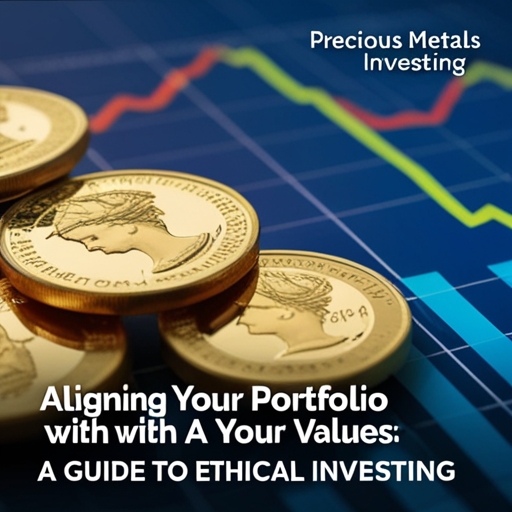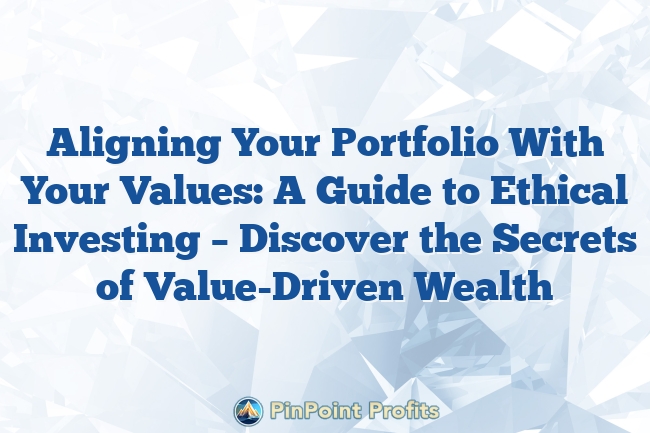In today's world, more and more investors are looking to align their financial decisions with their personal values. This growing trend has given rise to ethical investing, a approach that allows individuals to build wealth while making a positive impact on the world. If you're curious about ethical investing and how to incorporate it into your financial strategy, you've come to the right place.
This comprehensive guide will walk you through the ins and outs of ethical investing, providing you with the knowledge and tools you need to make informed decisions that reflect your values. From understanding the basics to exploring advanced strategies, we'll cover everything you need to know to embark on your journey towards value-driven wealth.
| Key Points | Description |
|---|---|
| Definition of Ethical Investing | Aligning financial goals with personal values |
| ESG Criteria | Environmental, Social, and Governance factors used to evaluate investments |
| Benefits | Supporting positive change, portfolio diversification, potential for stable returns |
| Challenges | Lack of standardized criteria, potential higher fees, balancing returns with ethics |
| Strategies | Diversification, regular portfolio review, consulting with specialized advisors |
What is Ethical Investing?
Ethical investing, also known as socially responsible investing or sustainable investing, is an investment strategy that seeks to align financial goals with personal values and beliefs. This approach goes beyond traditional financial metrics, considering the environmental, social, and governance (ESG) impacts of investments.
At its core, ethical investing involves choosing investments that reflect your principles while avoiding those that conflict with your values. For example, an ethical investor might choose to invest in renewable energy companies while avoiding those involved in fossil fuels or tobacco.

This approach allows investors to support causes they care about while potentially benefiting from financial returns. It's a way to use your investment capital as a force for positive change in the world.
Understanding ESG Criteria
ESG criteria are a set of standards used by socially conscious investors to screen potential investments. These criteria help evaluate a company's behavior and policies in three key areas:
- Environmental: This includes factors such as a company's carbon footprint, waste management practices, and use of renewable energy.
- Social: This encompasses issues like labor practices, human rights, and community relations.
- Governance: This refers to how a company is run, including factors like executive compensation, board diversity, and transparency.
By considering these criteria, investors can gain a more comprehensive understanding of a company's overall impact and potential risks. This information can be crucial in making informed investment decisions that align with personal values.
How to Align Investments with Personal Values
Aligning your investments with your personal values requires thoughtful consideration and research. Start by identifying the issues that matter most to you. These could include climate change, social justice, animal welfare, or any other cause you're passionate about.
Once you've identified your key values, research companies and funds that align with these principles. Look for those that prioritize ESG criteria and have a track record of responsible business practices.
Consider using a self-directed IRA to have more control over your investment choices. This can include investing in a Gold IRA or other precious metals IRA options that meet your ethical standards.
Benefits of Value-Driven Wealth
Value-driven wealth offers numerous benefits beyond financial returns. By investing ethically, you can:
1. Support companies that align with your values
2. Promote positive change in various industries
3. Potentially benefit from more stable long-term returns
4. Diversify your portfolio with alternative investments
5. Contribute to a more sustainable and equitable future
Ethical investing can also provide a hedge against inflation. By choosing companies with strong ESG criteria, investors may find more stable returns, contributing to long-term asset preservation and financial security.
Strategies for Ethical Portfolio Management
Effective ethical portfolio management involves several key strategies:
Diversification is crucial. Include a mix of traditional and alternative investments, such as a gold-backed IRA or gold ETF, to spread risk.
Regularly review your investments to ensure they continue to align with your values. Stay informed about changes in ESG criteria and adjust your portfolio accordingly.
Consider working with an IRA custodian who understands ethical investing. They can provide valuable insights and help you navigate the complexities of value-driven wealth management.
Common Challenges in Ethical Investing
While ethical investing offers many benefits, it also comes with its own set of challenges. One common issue is the lack of standardized ESG criteria. This can make it difficult to compare companies and funds across different sectors.
Additionally, ethical investments may have higher fees due to the extensive research involved in evaluating companies' ESG performance. It's important to consider these costs when making investment decisions.
Another challenge is balancing financial returns with ethical goals. Some ethical investments may not perform as well as traditional options in the short term. It's crucial to weigh the potential impact against the financial returns and align this with your long-term investment strategy.
Measuring the Impact of Your Investments
Measuring the impact of your investments is a crucial aspect of ethical investing. Start by evaluating the ESG criteria of your chosen companies. Look for measurable outcomes, such as reduced carbon emissions, improved labor practices, or increased board diversity.
Consider using tools and resources that provide impact reports. These can help you understand the real-world effects of your investments beyond financial returns.
Regularly review these reports to ensure your investments continue to align with your values and make adjustments as necessary. This ongoing evaluation process is key to maintaining an ethical portfolio that truly reflects your principles.
Tools and Resources for Ethical Investors
Fortunately, there are numerous tools and resources available for ethical investors. Many financial institutions now offer ESG-focused funds and portfolios. These can be a good starting point for those new to ethical investing.
Online platforms and apps can provide valuable insights into companies' ESG performance. They offer tools for tracking ESG criteria and measuring impact, making it easier for investors to make informed decisions.
Consider consulting with a financial advisor who specializes in ethical investing. They can provide personalized guidance based on your specific goals and values, helping you navigate the complex landscape of ethical investments.

Case Studies: Successful Ethical Investors
Examining case studies of successful ethical investors can provide valuable insights and inspiration. These examples often highlight the benefits of aligning investments with personal values and showcase strategies for overcoming common challenges.
For instance, consider the case of Jane, a retired teacher who decided to restructure her retirement portfolio to align with her environmental values. She invested in renewable energy companies and a Gold IRA for diversification. Over five years, her portfolio not only outperformed her previous traditional investments but also contributed to the growth of the clean energy sector.
Another example is the story of Mark, a young professional who used a self-directed IRA to invest in local businesses that prioritized fair labor practices and sustainability. His investment not only provided competitive returns but also supported job creation and sustainable practices in his community.
These case studies demonstrate that with careful planning and research, ethical investing can lead to both financial success and positive societal impact.
Balancing Financial Returns with Ethical Goals
One of the key challenges in ethical investing is balancing financial returns with ethical goals. While it's important to make a positive impact, most investors also need their investments to provide financial security, especially when planning for retirement.
Start by setting clear financial and ethical objectives. Determine what level of financial return you're comfortable with and how much impact you want to make. This will help guide your investment decisions.
Consider diversifying your portfolio to include both traditional and alternative investments. This can help balance risk and return. For example, you might combine ESG-focused stocks with a precious metals IRA or gold bullion investment.
Regularly review your investments to ensure they continue to meet both your financial and ethical goals. Be prepared to make adjustments as needed, always keeping in mind your long-term objectives.
The Future of Value-Driven Wealth
The future of value-driven wealth looks promising. As more investors prioritize ethical considerations, companies are increasingly focusing on improving their ESG performance. This trend is likely to continue, leading to more investment opportunities in the ethical space.
Technological advancements are playing a significant role in shaping the future of ethical investing. New tools and platforms are making it easier for investors to track and measure the impact of their investments. This increased transparency and accessibility will likely lead to more informed and effective ethical investing strategies.
We may also see a growing integration of ethical investing principles into mainstream financial practices. As the demand for ethical investments grows, traditional financial institutions are likely to expand their offerings in this area.
Getting Started with Ethical Investing
If you're ready to start your ethical investing journey, here are some steps to get you started:
1. Define your values and ethical priorities
2. Research companies and funds that align with these values
3. Consider opening a self-directed IRA for more investment flexibility
4. Explore alternative investments like a Gold IRA or precious metals IRA
5. Consult with a financial advisor who specializes in ethical investing
6. Start small and gradually increase your ethical investments over time
7. Regularly review and adjust your portfolio as needed
Remember, ethical investing is a journey, not a destination. As you learn and grow, your strategy may evolve, but your commitment to aligning your investments with your values will continue to guide your financial decisions.
Conclusion
Ethical investing offers a powerful way to align your financial goals with your personal values. By prioritizing ESG criteria and diversifying your portfolio, you can make a positive impact while building wealth. It's important to stay informed, regularly review your investments, and be prepared to adjust your strategy as needed.
While ethical investing comes with its challenges, the potential benefits – both financial and societal – make it a compelling approach for many investors. As the field continues to evolve, we can expect to see more opportunities for individuals to make a difference through their investment choices.
Whether you're just starting your investment journey or looking to realign your existing portfolio, ethical investing provides a path to financial success that aligns with your principles. By making thoughtful, value-driven investment decisions, you can contribute to positive change while securing your financial future.
What is the minimum amount needed to start ethical investing?
There's no set minimum. You can start with as little as you're comfortable investing, even if it's just a few hundred dollars in an ESG-focused mutual fund.
Can I convert my existing traditional IRA to an ethical investing strategy?
Yes, you can gradually shift your existing IRA investments to more ethical options. Consider consulting with a financial advisor to plan this transition effectively.
Are ethical investments more risky than traditional investments?
Not necessarily. While all investments carry risk, many ethical investments have shown comparable or even better performance than traditional options over the long term.

